One year ago, my book This American Ex-Wife was published. It was a New York Times bestseller and has stoked the ongoing cultural discourse around gender, marriage, relationships and equality.
This is because the book does more than talk about one specific marriage; it examines marriage as an institution and examines the ways in which American society uses marriage to trap women into doing the unpaid labor upon which everything else rests.
I’ve been surprised by the book’s reception among readers and critics. Some dismissed it as a relic of another time, claiming marriage is now equal or that they, at least, have equal marriages. So those who don’t — the argument goes — aren’t trying hard enough. But there is overwhelming evidence compiled and analyzed by people like
, Eve Rodsky, Pew Research, and, well everyone, showing how labor continues to be unequal in marriages, and marriage is like that by design.This lalalala-I-can’t-hear-you-fingers-in-the-ear brand of reactive feminism doesn’t serve us well. Donald Trump is president again. Reproductive rights are almost nonexistent. And the executive branch is gutting social services, which support families and make it possible for women to be single mothers. Our leaders are rounding up immigrants and passing laws attacking trans people, all in the name of protecting women.
Meanwhile, as ever, the real dangers to women lie inside the home. Homicide is a leading cause of death for pregnant women. Almost 20 percent of American marriages involve some form of physical violence. Emotional abuse is even more prevalent. A 2017 review of research into marriage concluded, “Within a traditional marriage, women tend to take more responsibility for maintaining social connections to family and friends and are more likely to provide emotional support to their husband, whereas men are more likely to receive emotional support and enjoy the benefit of expanded social networks — all factors that may promote husbands’ health and well-being.”
And the financial benefits that women once earned from marriage are now less enticing, as women graduate from college, get jobs, and buy homes at higher rates than men.
To argue, in Trump’s America, that gender is not an issue and that you can simply “marry better” to avoid inequality is to willfully ignore how political policy pushes women (white women specifically) into these legal contracts that are difficult to find your way out of. After all, it’s easier in America for a 16-year-old to get married than for a 46-year-old to get divorced. For most people in America, marriage is offered up instead of a social safety net.
Am I against relationships? No. I love them. I think they’re necessary. But under a regressive regime, which is now in place, the plan is clear: Continue to gut societal supports and make married women take up the slack.
Even couples who go into marriage dedicated to equality find themselves, five years and two kids later, drowning in the resentment of unequal labor. You cannot marry someone nice enough to overcome systemic inequality. And this hurts men too; it isolates them from the care work of the home and the community that arises.
The soft-girl life of being cared for by a provider sounds good, but it isn’t love or equality. It is still exploitative; it means women don’t have their own money or their own security when the relationship ends.
And no matter what comes out of the White House, women are seeing this reality. Fewer and fewer people are getting married. And while the people who write think pieces can wring their hands and wonder why, the answer is very clear: We are refusing to be complicit in systems designed for our oppression, and the oppression of others. Instead, we are building new kinds of relationships, families, and community.
Standing in contrast with some of the book’s more defensive interpretations are the emails and DMs I get every day telling me about women who escaped their marriages and found their lives again. Every single one of them is deeply moving; some are difficult to sit with. One woman emailed me recently to tell me how the book was passed around between her and her friends like feminist contraband. Two have gotten divorced now.
I think this speaks to the power of words and why our stories are important to tell. My book has gone into the world and is doing work I cannot even fathom and it will continue to have a life beyond what I can know. I am proud of my work, but I also know I could never have written the book without the hundreds of women who talked to me, who told me their stories, the people who read the newsletter and commented on things I wrote, that later became chapters in the book.
I began the book with a quote from Blanche Molineux, a woman who, in the early 1900s, escaped to the Dakota territories to get a divorce. Her story is told so wonderfully in the book The Divorce Colony by April White. In that book, Blanche is quoted as saying, “I desire my freedom above all else in the world and I am justified in seeking it.”
I think about this all the time. And as I look down the next four years, I realize how it’s more important than ever not to compromise on our freedoms.
In the year since the book published, I’ve released two seasons of a podcast, “This American Ex-Wife”, that now has nearly 200,000 downloads. The podcast examines all these issues in depth. And, if you are new here, I have written a lot of newsletters that give you a good taste of the book here in this newsletter.
Some of the most popular include:
Thank you so much for having these conversations with me. Thank you to the humans (however you identify) who engage here and are interested in doing the work of liberation.
Thank you for reading my manifesto to liberation, mugs, and finding happiness. I hope you love it in it’s new paperback version.
And now for a giveaway!
I have 100 bumper stickers that read, “Honk if your wife divorced you after reading Lyz Lenz.” (Thank you to the always-amazing
for the stickers! Garrett was once asked at a book event how he, a family man, felt sitting up on stage with me, a homewrecker. His answer was of course, “Amazing!”) Please subscribe to ’s newsletter .All you have to do, is email a picture of your copy of my book (any format works!) to menyellatme@gmail.com with the subject line “Giveaway" and include your address! The first 100 emailers get a bumper sticker!










I loved your book, and I think it made me stronger in my marriage - in that I am not willing to take on a whole lot of stuff I had before. I had a hard conversation about money tyranny (I don't make much, he makes more) and how he held that over me. I'm not afraid of divorce, but my husband and I have a conversation every anniversary about whether this is working for both of us. He's been divorced, I haven't. I'm glad he is listening, most of all, but if he didn't, I know I would be fine on my own. He'd have to adjust to losing our dog Jasper, and I would expect support payments for him :)
Those GD mugs.